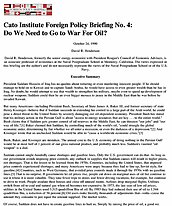President Saddam Hussein of Iraq has no qualms about torturing or even murdering innocent people. If he should manage to hold on to Kuwait and to capture Saudi Arabia, he would have access to even greater wealth than he has in Iraq. No doubt, he would attempt to use that wealth to strengthen his military, maybe even to speed up development of nuclear weapons. Saddam could then be an even bigger menace to peace in the Middle East than he was before he invaded Kuwait.
But many Americans–including President Bush, Secretary of State James A. Baker III, and former secretary of state Henry Kissinger–believe that if Saddam succeeds in extending his control to a large part of the Arab world, he could pose a direct threat to the United States by severely damaging our oil-dependent economy. President Bush has stated that his military action in the Persian Gulf is about “access to energy resources that are key … to the entire world.” Bush claims that if Saddam gets greater control of oil reserves in the Middle East, he can threaten “our jobs” and “our way of life.”[1] Baker claimed that Saddam, by controlling much of the world’s oil, “could strangle the global economic order, determining by fiat whether we all enter a recession, or even the darkness of a depression.”[2] And Kissinger wrote that an unchecked Saddam would be able to “cause a worldwide economic crisis.”[3]
Bush, Baker, and Kissinger are mistaken. The annual cost to the U.S. economy of doing nothing in the Persian Gulf would be at most half of 1 percent of our gross national product, and probably much less. Saddam’s vaunted “oil weapon” is a dud.

This work is licensed under a Creative Commons Attribution-NonCommercial-ShareAlike 4.0 International License.
